Billing in Accounting Explained

Clients better appreciate the value of the work—and are more likely to promptly pay the bill— when the product is delivered than if they don’t receive the invoice until weeks later. When a buyer receives an invoice, they’re expected to pay the amount owed within a specific timeframe, which is usually outlined on the invoice. This type of billing is commonly used in business-to-business transactions and is an important part of keeping track of payments and managing cash flow.
Second, uncompleted work is work-in-progress (WIP) inventory, a firm’s least valuable asset. CPA firms need to review each service they provide and price it accordingly (see Exhibit 2). They should examine what they do for the client, where they add value and how they apply their training, knowledge, experience and resources to arrive at a successful result. Without that understanding, CPA firms won’t bill the appropriate amount, and that usually means they will charge less than they should and could collect. Billing helps any business that sells goods to keep track of how much inventory they have available for sale and if each individual order has been fulfilled or not.
Features of billing software
CONCLUSIONCPAs must recognize that their firms are businesses that need to be properly managed. A key part of that is establishing and executing an effective billing process that sets the right fees, bills promptly and handles collections professionally. CPAs also need to learn how to communicate their value in a therapist invoice template way that shows clients that what they are paying is worth it.
- Effective customer communication and support are essential for building long-lasting relationships with customers and can help to prevent billing disputes and delays in payment.
- Practically, it involves checking all product codes and corresponding prices, verifying taxes, adding freight charges, and confirming pre-discussed payment terms, wherever applicable.
- However, one-time billing can be used by any industry that provides a product or service on a non-recurring basis.
- For businesses, one-time billing helps to reduce the complexity of managing ongoing subscriptions and payments.
- The length of this cycle varies from business to business, but it typically lasts between 20 to 25 days.
- One-time billing is like going to a restaurant and paying for your meal once, instead of being charged every time you take a bite.
Challenges in Billing Process
An invoice is a commercial statement issued by businesses to request payments from clients. It shows customers how much they owe and the “payment deadline“. It helps businesses to accelerate the payment collecting process and ensure that it will be realized on time. Having clear billing terms and policies is important because it helps to prevent misunderstandings and disputes between businesses and customers. Clear billing terms and policies can ultimately lead to faster payments and improved cash flow for businesses.

The steps involved in the billing process
Invoices can either be delivered physically through snail mail and fax or by writing an invoice email with the document attached. You can learn more about the elements of an invoice and how to create one from scratch by heading over to our guide on how to make an invoice. Most of us are likely to be familiar with the term ‘billing’ owing to its use in everyday speech.
The billing process is a set of steps that a business follows to create and send invoices to its customers for the products or services provided. It typically involves gathering customer and product/service information, generating an invoice, sending it to the customer, and tracking payment. The billing process is essential for maintaining accurate financial records and ensuring timely payment for goods and services rendered. Billing in accounting refers to the process of creating and issuing invoices to customers for goods sold or services rendered.
What’s more, it helps in building trustbetween the business and the customer, as it premium vs discount bonds demonstrates transparency and professionalism. Finally, accurate billing statements can help to prevent disputes and chargebacks, which can be time-consuming and costly for both the business and the customer. It involves delivering the invoices or bills to the customers through various methods such as email, mail, or online portals. It is important to streamline and automate the billing process as much as possible to ensure efficiency and accuracy. Utilizing accounting software or dedicated billing tools can simplify the process, reduce manual errors, and enhance the overall effectiveness of the billing process. As we’ve mentioned, billing is the process of generating and issuing invoices.
Further you can also file TDS returns, generate Form-16, use our Tax Calculator software, claim HRA, check refund status and generate rent receipts for Income Tax Filing. Progress billing is a method where billing is done incrementally throughout the life of the project. It is commonly used in large scale, long-term projects, such as infrastructure and defence projects. Make sure your customers are happy with your service and that there weren’t any order issues, and then bill them as soon as possible.
Billing software – A detailed analysis
In this article, we will delve into the world of billing in accounting, exploring its definition, importance, process, components, types, terms, and challenges. By gaining a comprehensive understanding of billing, businesses can optimize their financial operations and improve customer satisfaction. Discover the importance of accurate billing processes and the impact it has on overall financial management. Invoices, or sales invoices, on the other hand, are commonly issued for products that get sold on credit or that are recurring. So, when a customer accounting technology doesn’t pay for a good or service on the spot, businesses issue invoices instead of bills.
